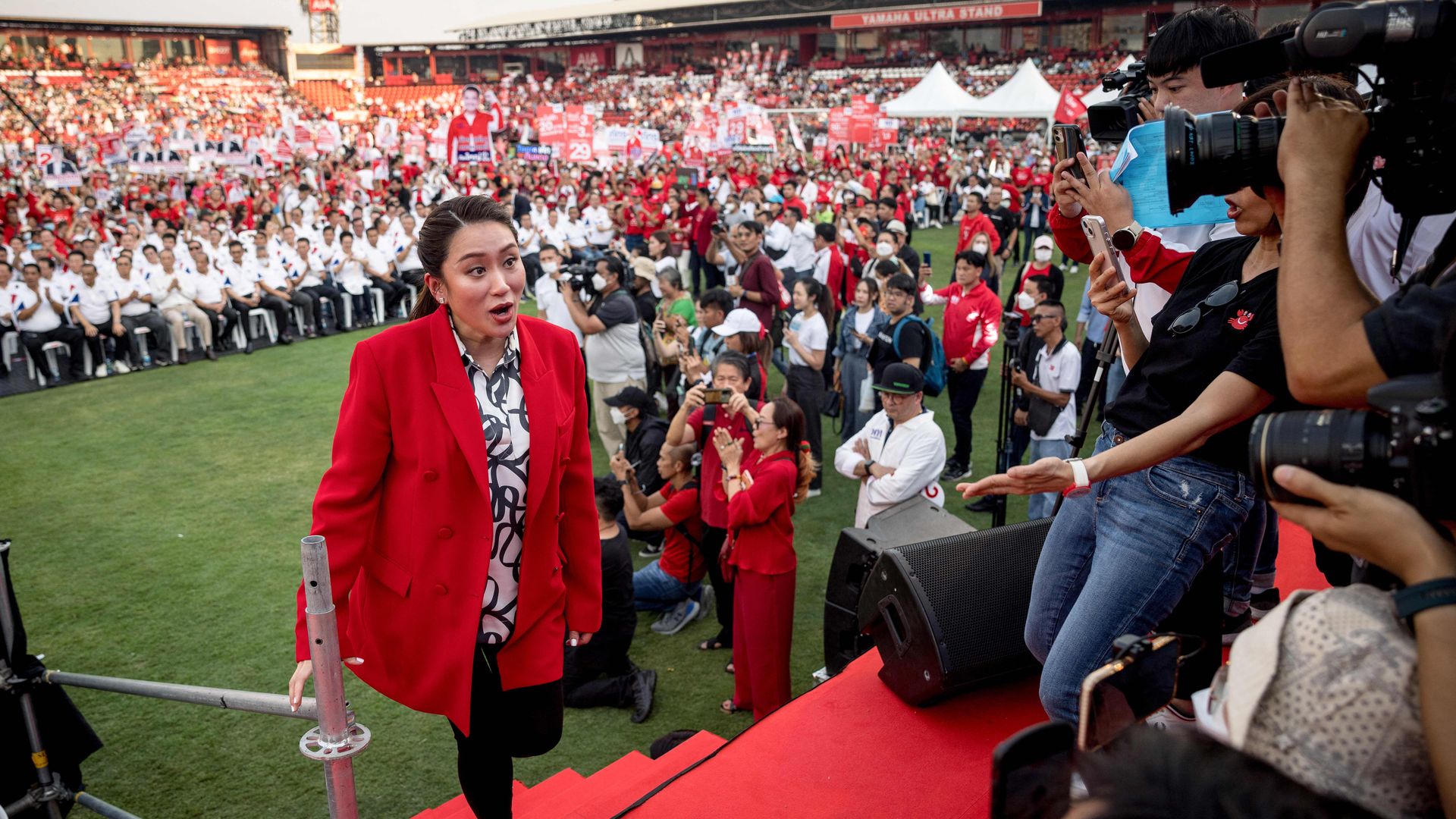Thailand's election pits democrats vs. generals
Add Axios as your preferred source to
see more of our stories on Google.

Paethongtarn Shinawatra arrives at a campaign rally last week. Photo: Jack Taylor/AFP via Getty Images
Thailand’s May 14 election pits Prime Minister Prayuth Chan-ocha and the military establishment against the youthful scion of the country’s most famous political dynasty, Paetongtarn Shinawatra.
Why it matters: Thailand has been in quasi-democratic limbo since 2019 when Prayuth was elected after stacking the deck in his own favor while leading a military junta. Since then, Thailand has seen dramatic protests and Prayuth's approval ratings have plummeted.
- While next month's vote will be "fundamentally flawed," according to Human Rights Watch, the outcome is highly uncertain.
- It could determine whether the Southeast Asian state, where the U.S. and China have been competing for influence, moves toward or away from democracy.
Flashback: In 2006, Thailand’s coup-prone military removed Paetongtarn’s father, Thaksin Shinawatra, a telecom tycoon and Thailand's most popular leader in recent history.
- In 2014, Gen. Prayuth led the junta that dissolved a government led by Paetongtarn’s aunt, Yingluck Shinawatra.
- The junta pushed through a new constitution that forces any new government to gain a majority of all legislators, including the elected lower house and an appointed upper house packed with military allies.
- Any government without military backing needs the support of up to 75% of elected legislators — an incredibly high bar for Paetongtarn's Pheu Thai and other opposition parties.
Yes, but: Polls suggest they might have a genuine shot at clearing it.
- A poll last month from the National Institute of Development Association put Pheu Thai at 50% and another progressive party, Move Forward, at 17%. Prayuth's United Thai Nation had 12%.
- Just 36, Paetongtarn marks a sharp contrast with the 69-year-old Prayuth.
- Assuming her father's mantle of "economic populism," Paetongtarn has promised to double the minimum wage.
The big picture: These are the first elections since massive youth-led protests began in 2020 calling for reform of the constitution, the military and even the monarchy — unheard of in a country where strict lèse-majesté laws mean insulting the king can result in jail time.
- Pheu Thai has backed some of the protesters' demands, such as revising the constitution, but not the calls to reform lèse-majesté.
- It's a delicate balancing act. The predecessor party to Move Forward was disbanded in 2020, nominally for campaign finance violations, after daring to question the power of both the military and the monarchy.
Breaking it down: "Backroom dealmaking" will likely trump the ballot box in deciding who governs Thailand, according to an analysis from the ISEAS - Yusof Ishak Institute.
- An opposition landslide big enough to overcome the Senate's opposition and sweep Pheu Thai into power is possible but unlikely, authors Napon Jatusripitak and Ken Mathis Lohatepanont write.
- That leaves a "status quo" government of conservative and pro-military parties, or a "crossover" coalition involving Pheu Thai and at least one pro-military party.
What's next: None of those scenarios is likely to produce a stable democratic trajectory, the authors write.
- Neither did the last election, but it did unleash a wave of protests that shook the establishment to its core. Thailand's politics may not be truly democratic, but they are certainly unpredictable.
